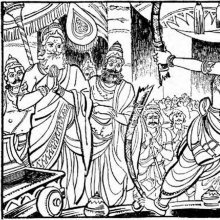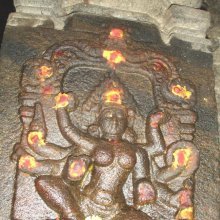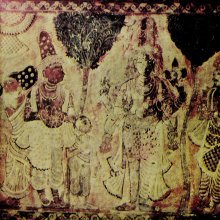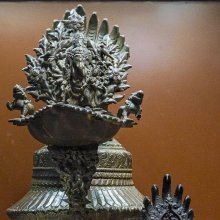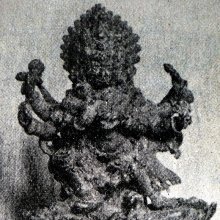Destroyer: 1 definition
Introduction:
Destroyer means something in Hinduism, Sanskrit. If you want to know the exact meaning, history, etymology or English translation of this term then check out the descriptions on this page. Add your comment or reference to a book if you want to contribute to this summary article.
Images (photo gallery)
(+3 more images available)
In Hinduism
Shaktism (Shakta philosophy)
Source: ORA: Amanaska (king of all yogas): (shaktism)The Destroyer is denoted by the Sanskrit term Hartṛ, according to the 17th century Kaulagajamardana (“crushing the Kaula elephant”) authored by Kāśīnātha or Kṛṣṇānandācala.—Accordingly, [as Īśvara said to Pārvatī]: “[...] O great Goddess, hear about the Jain. He always carries a pitcher. He is simply a soul and never an enjoyer, doer and destroyer (hartṛ). He is called a Jain, and Buddhists and [the like] are considered [to be similar]. [...] These are the different varieties in brief; they are [all] called Pāṣaṇḍas [because] they have been excluded from the vedic path. [...]”

Shakta (शाक्त, śākta) or Shaktism (śāktism) represents a tradition of Hinduism where the Goddess (Devi) is revered and worshipped. Shakta literature includes a range of scriptures, including various Agamas and Tantras, although its roots may be traced back to the Vedas.
See also (Relevant definitions)
Full-text (+966): Samhartri, Hartri, Vinasaka, Mara, Ucchettri, Purandara, Pratihartri, Bhanktri, Vibhettri, Abhikshattri, Maryadabhedaka, Balavritranisudana, Matsyanashana, Rukmidarin, Madhusudana, Shamantaka, Abhikshada, Madhumathana, Bhindu, Nisudana.
Relevant text
Search found 229 books and stories containing Destroyer; (plurals include: Destroyers). You can also click to the full overview containing English textual excerpts. Below are direct links for the most relevant articles:
Atharvaveda and Charaka Samhita (by Laxmi Maji)
Treatment of Epilepsy (Mṛgī) < [Chapter 3 - Diseases and Remedial measures (described in Atharvaveda)]
Treatments of Viṣūcikā disease (cholera) < [Chapter 3 - Diseases and Remedial measures (described in Atharvaveda)]
2a. Tuberculosis (Yakṣmā or Rājayakṣmā) in the Atharvaveda < [Chapter 5 - Diseases and Remedies in Atharvaveda and Caraka-Saṃhitā]
Jnaneshwari (Bhavartha Dipika) (by Ramchandra Keshav Bhagwat)
Verse 1.43-46 < [Chapter 1 - Arjuna’s Dolour]
Verse 1.42 < [Chapter 1 - Arjuna’s Dolour]
Verse 11.27 < [Chapter 11 - Vishvarupa-darshana-yoga]
The Book of Protection (by Piyadassi Thera)
Discourse 16 - The Discourse At Isigili < [Discourses]
The Gautami Mahatmya (by G. P. Bhatt)
Mahabharata (English) (by Kisari Mohan Ganguli)
Section CLXXXI < [Ghatotkacha-badha Parva]
Section XXV (Bhagavad Gita Chapter I) < [Bhagavat-Gita Parva]
Section LXIII < [Bhagavat-Gita Parva]
Bhagavadgita (by Kashinath Trimbak Telang)

